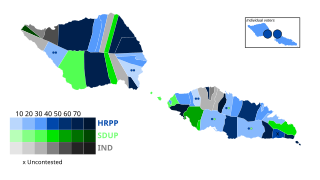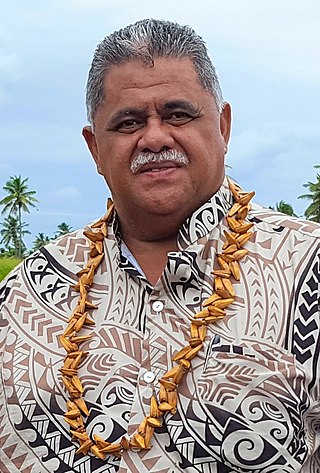Related Research Articles

SusugaTuilaʻepa Lupesoliai Neioti Aiono Saʻilele Malielegaoi is a Samoan politician and economist who served as the sixth prime minister of Samoa from 1998 to 2021. Tuilaʻepa is Samoa's longest serving prime minister and was leader of the opposition from 2021 to 2022. Since 1998, he has led the Human Rights Protection Party (HRPP). Tuilaʻepa first entered parliament in 1981 when he won a by-election to represent the electorate of Lepā. He also served as deputy prime minister and minister of finance in the government of Prime Minister Tofilau Eti Alesana, and also held the portfolios of Tourism and Trade, Commerce & Industry.
The Samoa Party was a small party of Samoa. The party was founded in September 2005 by former auditor-general Su'a Rimoni Ah Chong on a platform of restoring the independence of watchdog institutions such as the Auditor-General. The party also aimed to provide free education, and impose a term limit on future Prime Ministers of two terms. During the 2006 Samoan general election, it did not secure any seats.

General elections were held in Samoa on 31 March 2006 to determine the composition of the 14th Parliament. The main contesting parties were that of incumbent Prime Minister Tuilaʻepa Saʻilele Malielegaoi, of the Human Rights Protection Party (HRPP); and the Samoan Democratic United Party (SDUP). In addition, three other parties, the Christian Party (SCP), the Samoa Party (SP), and the Samoa Progressive Party (SPP), competed in the election. The result was a landslide victory for the HRPP, which won 33 of the 49 seats. The newly founded SDUP secured ten seats, and the remaining six were won by independents. After the election, three independents joined the HRPP, increasing the party's seat count to 36.

Tuiletufuga Le Mamea Ropati Mualia is a Samoan politician, and member of the Council of Deputies. He has served as a Cabinet Minister, Leader of the Opposition and represented the constituency for Lefaga & Falese'ela for over thirty years. He was a founding member of the Human Rights Protection Party.

SusugaLaʻaulialemalietoa Leuatea Polataivao Fosi Schmidt is a Samoan politician, businessman, Cabinet Minister, and former speaker and deputy speaker of the Samoan Parliament. He is the Member of Parliament for the Gagaʻifomauga No. 3 constituency and is the founder and chairman of the Faʻatuatua i le Atua Samoa ua Tasi (FAST) party.

The Tautua Samoa Party was a political party in Samoa. The party's policies include economic development, particularly in the agricultural sector, public service reform, a limit on the number of Associate Ministers, and a reduction in the term of Parliament from 5 to 3 or 4 years. Its president was Afualo Wood Salele.

Lealailepule Rimoni Aiafi is a Samoan politician and member of the Legislative Assembly of Samoa. He is the founder of the Tautua Samoa Party.
Vaʻai Papu Vailupe, also known as Mafasolia Papu Vailupe, was a Samoan politician and accountant who served as a Cabinet Minister. He was the leader of the Tautua Samoa Party from 2010 to 2011. His father is former Prime Minister Vaʻai Kolone, who co-founded the Human Rights Protection Party (HRPP). His younger brother Asiata Sale'imoa Va'ai was leader of the Samoan Democratic United Party.
Afemata Palusalue Faʻapo II is a Samoan politician and former Cabinet Minister. From 2011 to 2016 he was the leader of the opposition Tautua Samoa Party.

General elections were held in Western Samoa on 26 April 1996 to determine the composition of the 12th Parliament. The election occurred following constitutional amendments that extended the parliamentary term from three to five years and increased parliament's seat count from 47 to 49. Five parties contested the election, including the governing Human Rights Protection Party (HRPP), led by Prime Minister Tofilau Eti Alesana and the main opposition, the Samoan National Development Party (SNDP), led by Tui Ātua Tupua Tamasese Efi. The HRPP's popularity suffered a setback due to Chief Auditor Sua Rimoni Ah Chong's 1994 report, which brought to light government corruption. While the SNDP campaigned on anti-corruption, the party's perceived failure to provide checks on the HRPP meant the governing party faced few obstacles to re-election.
Ale Vena Ale is a Samoan politician and member of the Legislative Assembly of Samoa. He is a founding member of the Human Rights Protection Party.

General elections were held in Samoa on 4 March 2011, to determine the composition of the 15th Parliament. Two parties contested the election, the ruling Human Rights Protection Party (HRPP), which had been in power for most of the time since 1982, led by Prime Minister Tuilaʻepa Saʻilele Malielegaoi and the newly founded Tautua Samoa Party (TSP) led by Vaʻai Papu Vailupe, which several minor parties had merged into. The election occurred following amendments to the electoral act in 2009, including the introduction of the Monotoga law, a requirement for aspiring candidates to dedicate traditional village service and commitments. As a result, three TSP aspiring candidates, including a challenger for the prime minister's seat, were disqualified by the Supreme Court for failing to satisfy this law.

General elections were held in Samoa on 9 April 2021 to determine the composition of the 17th Parliament. The Human Rights Protection Party (HRPP), which had been in government for most of the time since 1982, was led into the election by Tuilaʻepa Saʻilele Malielegaoi, who had served as prime minister since 1998. The passage of the controversial Land and Titles bills by the HRPP led some party members to defect, establishing the Faʻatuatua i le Atua Samoa ua Tasi (FAST) party promising a repeal. FAST elected Fiamē Naomi Mataʻafa, the daughter of Samoa's first prime minister, as leader shortly before the election; she left the ruling party and resigned as deputy prime minister in 2020, also in opposition to the amendments.
Ili Setefano Taʻateo Tafili is a Samoan politician and matai. He is a member of the Tautua Samoa Party.
Papaliʻi Liʻo Oloipola Taeu Masipau is a Samoan politician and Speaker of the Legislative Assembly of Samoa.

General elections were due to be held in Samoa on 21 May 2021. They were called by O le Ao o le Malo Tuimalealiʻifano Vaʻaletoʻa Sualauvi II following the inconclusive results of the April 2021 election, but before the new parliament had even been convened or numerous electoral court petitions settled.

A constitutional crisis began in Samoa on 22 May 2021 when O le Ao o le Malo Tuimalealiʻifano Vaʻaletoʻa Sualauvi II issued a proclamation purporting to prevent the Legislative Assembly from meeting in the wake of the general election in April 2021. Court rulings had upheld the election results, giving a parliamentary majority to the Faʻatuatua i le Atua Samoa ua Tasi (FAST) party, led by Fiamē Naomi Mataʻafa. On 24 May 2021, a makeshift ceremony was held outside of Parliament to swear in Mata'afa as prime minister. On 23 July the Court of Appeal declared that the ceremony was binding and that FAST had been the government since that date.

Six simultaneous by-elections were held in Samoa on 26 November 2021. They were called in the aftermath of the 2021 Samoan general election, which resulted in seven seats being vacant due to resignations and convictions for bribery and treating. While seven by-elections were called, the contest in Falealupo was resolved without the need for a poll, after the Supreme Court declared the HRPP candidate Tuitogamanaia Peniamina Le'avai to be ineligible, resulting in the FAST Party's Fuiono Tenina Crichton being elected unopposed.
References
- 1 2 3 Ah Chong v Legislative Assembly of Western Samoa, [1996]WSCA2 (17 September 1996)("The plaintiff in the Supreme Court proceedings from which this appeal arises was appointed in March 1992 (the date given in his statement of claim) as Controller and Chief Auditor in the service of Western Samoa. ... The plaintiff was about 38 years of age at the time of his appointment.").
- ↑ "Land Reform Bill not Samoan, says Samoa Party". Radio New Zealand . 30 April 2008. Retrieved 10 December 2020.
- 1 2 Ah Chong v Legislative Assembly of Western Samoa, [1996]WSSC3 (23 January 1996).
- ↑ "Constitution Amendment Act (No 1) 1997". Samoa Sessional Legislation. Pacific Legal Information Institute. Retrieved 2017-12-17.
- ↑ "Former Samoan auditor wins TI Integrity Award". RNZ. 16 May 2003. Retrieved 10 December 2020.
- ↑ "Former Samoan auditor general aims to lead new party into parliament". RNZ. 20 September 2005. Retrieved 10 December 2020.
- ↑ "Samoa ruling party returned to office in weekend election". RNZ. 3 April 2006. Retrieved 10 December 2020.
- ↑ "Leader of Samoa Party banished from his village". RNZ. 19 July 2006. Retrieved 10 December 2020.
- ↑ "Samoa Supreme Court overturns village council ban". RNZ. 9 August 2006. Retrieved 10 December 2020.
- ↑ "Samoan village matai reject court instruction to lift ban on politician". RNZ. 14 August 2006. Retrieved 10 December 2020.
- ↑ "Samoa Supreme Court declare void two parliamentary seats". RNZ. 17 August 2006. Retrieved 10 December 2020.
- ↑ "Family home of Samoa Party leader destroyed by fire". RNZ. 19 August 2006. Retrieved 10 December 2020.
- ↑ "Bribery charges laid against Samoan election candidate". RNZ. 23 August 2006. Retrieved 10 December 2020.
- ↑ "Samoa Party leader Su'a guilty of bribery". RNZ. 27 September 2006. Retrieved 10 December 2020.
- ↑ "Leader of Samoa Party to return Transparency award". RNZ. 2 October 2006. Retrieved 10 December 2020.
- ↑ "Tautua Samoa party announces election candidates". RNZ. 7 January 2011. Retrieved 10 December 2020.
- ↑ Pacific Islands Monthly: PIM ., published by Pacific Publications., 2000, pg 25